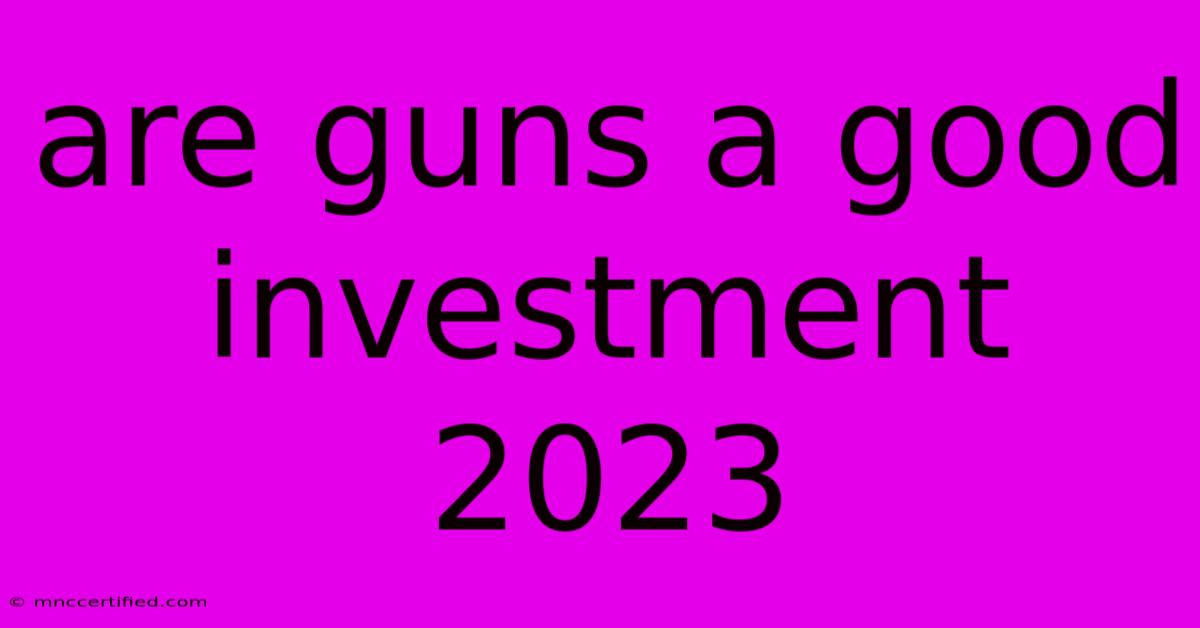Are Guns A Good Investment 2023

Table of Contents
Are Guns a Good Investment in 2023? A Comprehensive Analysis
The question of whether guns are a good investment in 2023 is complex, multifaceted, and depends heavily on individual circumstances, motivations, and market conditions. Unlike traditional investments like stocks or bonds, firearms present unique challenges and opportunities. This article will explore the various aspects to help you make an informed decision.
The Case for Guns as an Investment
Some argue that firearms can be a worthwhile investment, citing several factors:
Collectibility and Appreciation:
Certain firearms, especially antique, rare, or limited-edition models, can appreciate significantly in value over time. Think of highly sought-after brands like Colt, Winchester, or even specific military-issue firearms. Their value can increase due to rarity, historical significance, and collector demand. However, this requires significant knowledge of the firearms market and careful selection. Investing in the wrong firearm can lead to losses.
Hedge Against Inflation and Uncertainty:
Historically, during times of economic instability or inflation, tangible assets like precious metals and collectibles often retain or increase their value. Some investors see firearms as a similar safe haven, particularly in regions with volatile political climates or concerns about social unrest. This is a speculative argument, however, and not a guaranteed outcome. Market forces still dictate value, even for tangible assets.
Self-Defense and Personal Security:
While not strictly a financial investment, the perceived value of owning a firearm for self-defense is a key motivator for many buyers. The peace of mind and potential protection it offers can be considered a form of investment in personal security. This is a subjective benefit and should not be solely viewed as a financial investment strategy.
The Case Against Guns as an Investment
There are significant drawbacks to considering firearms as an investment:
Market Volatility and Depreciation:
Unlike stocks with established markets and readily available information, the firearms market can be unpredictable. The value of a firearm can fluctuate based on various factors, including changes in legislation, public perception, and supply and demand. Many firearms depreciate in value over time, especially common models.
Storage, Maintenance, and Insurance Costs:
Owning firearms entails ongoing expenses. Proper storage is crucial for safety and to maintain the firearm's condition. Regular cleaning and maintenance are also necessary, adding to the overall cost. Insurance for liability and damage is another factor to consider, especially if you own multiple firearms. These costs can significantly eat into any potential appreciation.
Legal and Regulatory Risks:
Firearms are subject to strict regulations that vary by location. Changes in laws can impact the legality and value of certain firearms. Possessing illegal firearms can result in severe penalties. Staying informed about relevant laws and regulations is crucial, and any legal issues could significantly impact your investment.
Ethical Considerations:
Investing in firearms is inherently tied to ethical considerations surrounding gun violence and public safety. The potential for misuse is a factor that must be acknowledged. This is a significant consideration that transcends pure financial returns.
Conclusion: Is it a Good Investment for You?
The decision of whether or not guns are a good investment in 2023 is highly personal. While certain collectible firearms can appreciate in value, the market is volatile, and significant costs are associated with ownership. For pure financial investment, other options generally present less risk and more predictable returns. If you are considering firearms, prioritize thorough research, understanding of the market, and compliance with all relevant laws and regulations. The potential for appreciation should be weighed against the inherent risks and ethical considerations. Remember, self-defense is a key motivator for many, but this is a personal choice and not a financial investment strategy.

Thank you for visiting our website wich cover about Are Guns A Good Investment 2023. We hope the information provided has been useful to you. Feel free to contact us if you have any questions or need further assistance. See you next time and dont miss to bookmark.
Featured Posts
-
Db Cooper Hijacking Evidence Update
Nov 26, 2024
-
Investments Ii Womens Clothing
Nov 26, 2024
-
Newcastle Vs West Ham Tv Guide And Live Stream
Nov 26, 2024
-
Hanover Insurance Vs State Farm
Nov 26, 2024
-
Roy Keane Fan Confrontation Video
Nov 26, 2024